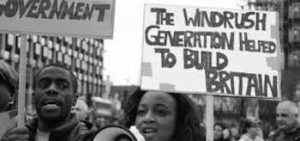
*On this date in 1948, the Windrush Generation began. These were Black individuals from British colonies who journeyed to Europe in the 20th century.
After World War II, many Afro Caribbean people migrated to North America and Europe, especially the United States, Canada, the United Kingdom, France, and the Netherlands. Due to the losses during the war, the British government began to encourage mass immigration from former British Empire and Commonwealth countries to fill labor market shortages.
The British Nationality Act of 1948 gave citizenship of the UK and its colonies to all people living in the United Kingdom and its colonies, as well as the right of entry and settlement in the UK. Many West Indians were attracted by better prospects in what was often referred to as the mother country. An advertisement in a Jamaican newspaper offered cheap transport on the ship for anybody who wanted to come and work in the United Kingdom. Many former servicemen took this opportunity to return to Britain with the hopes of rejoining the RAF, while others decided to make the journey to see what England was like.
The British ship HMT Empire Windrush brought a group of 802 migrants to the port of Tilbury, near London, on June 22, 1948. The arrival of passengers has become a significant landmark in the history of modern Britain, and the image of West Indians disembarking from the ship's gangplank has come to symbolize the beginning of modern British multicultural society. The British government did not expect the arrival of West Indian immigrants and was not welcome. In the same month, Arthur Creech Jones, the Secretary of State for the Colonies, noted in a Cabinet memorandum that the Jamaican Government could not legally prevent people from departing, and the British government could not legally prevent them from landing.
However, he stated the government opposed this immigration, and all possible steps would be taken by the Colonial Office and the Jamaican Government to discourage it. In June 1950, a Cabinet committee was established with the terms of reference of finding "ways which might be adopted to check the immigration into this country of colored people from British colonial territories." In February 1951, that committee reported that no restrictions were required. There was a significant amount of work available in post-war Britain, and public transport was predominantly staffed by recruits from Jamaica and Barbados. Though Afro Caribbean people were encouraged to journey to Britain through immigration campaigns created by successive British governments, many new arrivals endured prejudice, intolerance, and racism from white society.
Early African Caribbean immigrants found that private employment and housing were denied to them based on race. Trade unions would often not help African-Caribbean workers, and some pubs, clubs, dance halls, and churches would bar Blacks from entering. Housing was in short supply following the wartime bombing, and the shortage led to some of the first clashes with the established white community. In 1958, white youths' attacks in the London area of Notting Hill marred relations with West Indian residents. The following year, as a positive response from the Caribbean community, an indoor carnival event organized by West Indian Gazette editor Claudia Jones took place in St Pancras Town Hall. It would be a precursor to what became the annual Notting Hill Carnival.
Historian Winston James argues that the experience of suffering racism was a major factor in developing a shared Caribbean identity among immigrants from various islands and class backgrounds. The shared employment experience by organizations such as London Transport and the National Health Service also played a role in building the British African Caribbean identity. Social Geographer Ceri Peach estimates that the number of people in Britain born in the West Indies grew from 15,000 in 1951 to 172,000 in 1961. In 1962, the UK enacted the Commonwealth Immigrants Act, which restricted the entry of immigrants. By 1972, only holders of work permits or people with parents or grandparents born in the United Kingdom could gain entry, effectively stemming most Caribbean immigration. Despite the restrictive measures, an entire generation of Britons with African Caribbean heritage now exists, contributing to British society in virtually every field.
In 1998, an area of public open space in Brixton was renamed Windrush Square to commemorate the 50th anniversary of the ship's arrival, bringing the first large group of West Indian migrants to the United Kingdom. In 2018, at the height of the Windrush scandal, it was announced by the British government that on June 22, an annual Windrush Day would be held, supported by a grant of up to £500,000, to recognize and honor the contribution of those who arrived between 1948 and 1971 and to "keep their legacy alive for future generations, ensuring that we all celebrate the diversity of Britain’s history."